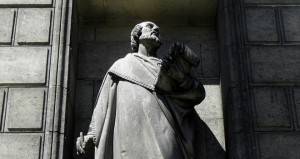Helmut Thielicke offers an important anthropological distinction, one that stems early on from someone as astute as Irenaeus, and then becomes appropriated and modified by someone as seismic, in the Latin church, as Thomas Aquinas. If this is not understood as a basic theological-anthropological datum vis-à-vis some form of classical theism,  engaging with the theological past into the present will become immediately unintelligible—which I would suggest is why so much of popular apologetics and theologics that we see pervasive, particularly in the online theological world, ends up being an exercise in futility. I digress. Let’s hear from Thielicke on this all-important distinction, and yet complement, between ‘nature’ and ‘grace’ vis-à-vis the history of theological ideas:
engaging with the theological past into the present will become immediately unintelligible—which I would suggest is why so much of popular apologetics and theologics that we see pervasive, particularly in the online theological world, ends up being an exercise in futility. I digress. Let’s hear from Thielicke on this all-important distinction, and yet complement, between ‘nature’ and ‘grace’ vis-à-vis the history of theological ideas:
It is very important that we understand this distinction between natural endowment and supernatural destiny, whereby the former the former is something firmly given and in substance indestructible whereas the latter is something variable which can be won or lost. For it is through this distinction so basic for later Roman Catholicism between nature and supernature, between nature and grace, the distinction which allows for the imago’s having an explicitly ontological character which continues intact through its impairment by sin and its restoration by grace. For with this distinction two ontic spheres are marked off in man. One of these, the sphere of nature, is constant. It cannot be altered in substance. The other, however, the sphere of supernature, is variable, ie, it is added or not added, and it can be lost.1
It is interesting that Thielicke draws this out of Irenaeus. Typically, this sort of distinction, between nature and grace, is attributed to Aquinas, indeed for good reason. But Thielicke makes a good case for this in Irenaeus as he notes the distinction Irenaeus made between the imago and similtudo; the former correspondent with ‘natural endowment,’ and the latter with ‘supernatural gift.’ But as this distinction is appropriated by someone like Thomas Aquinas what we get, as that is reified with Aristotelian categories, is what Norman Fiering, among others, identifies as Thomist Intellectualism. This is why, for Catholic theology, and scholastic Reformed theology, following, when the fall happens the imago cannot ultimately be plunged into a subhumanity, this is because the very nature of humanity is such that it retains its substantial point of contact with the samelike Godform it is given birth by. That is to say, the very integrity of humanity, on the ‘intellectualist’ account, is contingent upon its esse which it shares with God. If God is actus purus (pure being) defined by His Super intellect in monadic relief, then the very integrity of His imago in humanity must remain intact in order for humanity to retain its created integrity vis-à-vis God. Further, this integrity is such that it only has telos insofar that it finds its ‘elevation’ and supernatural completion as it cooperates with the ‘created grace’ that God gifts it, by eternal design, in the ‘accidents’ of its ‘essence’ as the image bearers of God. But key here, is that the fall didn’t actually “kill” the natural essence of what it means to be human, as such, in a sickness/remedy symmetry, salvation doesn’t require re-creation, but simply an ‘addition’ of medicine (created grace) into the accidents of the fallen human, such that said human can habituate (habitus) in the virtues of God, cooperate by way of gratia infusa, and finally actualize and experience what the human destiny always already has been by way of God’s supernatural complement to the natural way. So Thomas:
In the original integrated state of man reason controlled our lower powers perfectly and God perfected the reason subordinated to him. This state was lost to us by Adam’s sin, and the resulting lack of order among the powers of our soul that incline us to virtue we call a wounding of nature. Ignorance is a wound in reason’s response to truth, wickedness in will’s response to good; weakness wounds the response of our aggressive emotions to challenge and difficulty, and disordered desire our affections’ reasonable and balanced response to pleasure. All sins inflict these four wounds blunting reason’s practical sense, hardening the will against good, increasing the difficulty of acting well and inflaming desire.2
Sometimes however men willingly suffer minor impoverishments so as to gain a major enrichment, and then the sufferings are medicinal rather than punitive. As such no particular sin is their cause, unless one say that the very need for medicine is due to our damaged nature and so is a penalty for inherited sin.3
Now this nature is disordered, however, man falls short even of the goodness natural to him, and cannot wholly achieve it by his own natural abilities. Particular good actions he can still perform in virtue of his nature (building houses, planting vineyards and the like); but he falls short of the total goodness suited to his nature. He is like a sick man able to make certain movements by himself, but unable to move like a man in perfect health until he has had medicine to heal him.4
I have left many things undeveloped in this post; rather enthymemic, really. But maybe you will still be able to catch somewhat of the gist of things by what I have shared.
1 Helmut Thielicke, Theological Ethics: Foundations (Philadelphia: Fortress Press, 1966), 203.
2 St. Thomas Aquinas, Summa Theologiae Concise Translation, 270-1.
3 Ibid., 273.
4 Ibid., 308.